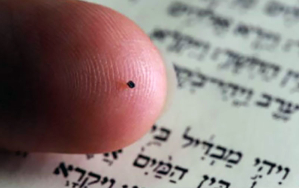
The smallest readable Bible in the world has gone on display at the Israel Museum in Jerusalem as part of celebrations surrounding the museum's 50th anniversary.
According to a report from BBC News, this copy of the Hebrew Bible is the size of a pinhead and has been termed the Nano Bible. Engineers used an ion beam to carve out over 1.2 million letters on a gold-plated silicon chip.
"We just showed the book for the first time ever, the exhibition of the Nano Bible," Dr. Adolfo Roitman, curator at the Shrine of the Book, said. "It is the smallest Bible on the earth."
According to a report from JNS.org, the Israel Museum also plans to exhibit a documentary on the creation of the Nano Bible, which can be read under a microscope. JNS elaborated on the composition of the world's smallest Bible.
"It is 0.04 square millimeters, and 0.00002 millimeters (20 nanometers) deep," JNS wrote. "The 1.2 million letters of the bible were written using a focused ion beam generator that shot gallium ions onto a gold surface covering a base layer of silicon."
JNS reported that Professor Uri Sivan and Dr. Ohad Zohar of the Technion's Russell Berrie Nanotechnology Institute developed the idea. Engineers from the Techninon's Sara and Moshe Zisapel Nanoelectronics Center helped manufacture the chip and developed the software that enabled the engraving of the letters.
"The tiny Bible will be displayed alongside the Dead Sea Scrolls and the Aleppo Codex, a manuscript of the Jewish Bible from 10th century [A.D.]," JNS wrote.
Roitman told BBC News that it would be the first time that the Nano Bible would be on display to the public.
"It's the first time the general public [would] have the opportunity to look at these incredible technological developments right here in Israel," Roitman said. "The whole Hebrew Bible is engraved here on gold silicon, pinhead size. Around [1.2 million] letters [of the] Hebrew Bible are engraved in this incredible development."
Roitman further elaborated on the production process. He noted that the text can be read after viewers zoomed in 10,000 times.
"It's not an electronic chip," Roitman said. "It's the same technique used in antiquity by our forefathers, to engrave, in this case, not just using a chisel, but using an ion beam."
Roitman hoped that students and young people who visited the Israel Museum to see the Nano Bible would be inspired by the advancement in technology used to create it.
"The Hebrew Bible is so basic for the Israelis," Roitman said. "The idea was to put the whole Hebrew Bible in this nano-technological development, to teach students how incredible nanotechnology is."






